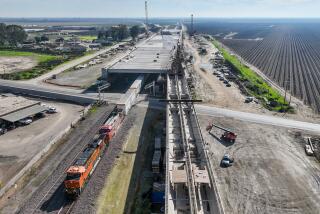Congress Urged to Fully Fund Super Collider
- Share via
WASHINGTON — The nation’s ambitious plan to build an $8.3-billion atom smasher is on the verge of collapse, and Congress should provide the financing itself instead of counting on obtaining $2 billion in foreign contributions, a program official said Saturday.
J. Fred Bucy, until Friday the head of a Texas commission set up to raise money for the superconducting super collider project, said the situation was “not beyond salvation, but it’s getting close.” He called on Congress to step up financing--rather than cutting funds, as it has been--to make up the difference.
The Bush Administration has been assuring lawmakers that foreign governments would contribute. The United States initially asked Japan to pledge $2 billion by itself, but Tokyo never formally agreed.
So far, only one country, India, has said it would be willing to contribute--in this case, $50 million.
“In my opinion, the Japanese are not going to participate in any significant way,” Bucy said in a telephone interview on Saturday. “The whole issue of foreign contributions is a red herring, and we need to get rid of that yoke.”
Bucy made his remarks in an interview after resigning his post in Texas, partly to give himself more leeway to lobby for additional funds in Washington. He said his state job as head of the National Research Laboratory Commission did not leave him with sufficient time.
His resignation from the post seemed likely to intensify debate over the massive program, which its proponents in this country have touted as a vehicle for propelling the United States ahead of foreign competitors in the technology race.
Bucy conceded that his selling job will not be easy. Strapped by a tight budget, Congress has been cutting back on costly science projects--including the super collider.
For the coming fiscal year, President Bush asked for $534 million for the super collider program, but the House cut the request by $100 million. The Senate is to take up the issue when Congress returns from summer recess, and supporters hope to restore at least $75 million.
The super collider is designed to propel two beams of protons to nearly the speed of light before they collide, allowing physicists to study the subatomic debris for clues about the origins of the universe.
Bucy said Saturday that the high-energy physics research project is so vital scientifically that, despite its mounting costs, America now must go it virtually alone.
He said the dearth of foreign contributions effectively “is going to give our opponents the opportunity to cancel the program. So now is the time to settle the question about foreign support. We need to debate it now, not a year from now.”
The demise of the project could have repercussions throughout the country. Already, the project has more than 1,100 employees on the payroll, and 8,500 contracts totaling more than $100 million have been awarded--including 416 contracts totaling $20 million in California.
The newest wrinkle in the funding debate also comes at a time when the project’s backers will soon need to ask Congress for significantly higher appropriations for coming years--about $700 million for fiscal 1993 and $900 million by 1995.
The federal government initially said it would spend no more than $5 billion in all. Texas is providing another $1 billion, with the rest to come from international partners.
The effort was originally billed in 1987 as a $4.4-billion project. But an internal estimate at the Department of Energy, the project’s manager, last fall put that figure at $11.8 billion--meaning that the project would require nearly $6 billion from abroad.
European nations are not likely sources of super collider funds because they have their own, competing instrument, near Geneva.
Proponents of the project have been pressing to persuade the President to bring up the issue during his meeting this week with Japanese Prime Minister Toshiki Kaifu, who is coming to the United States in advance of the annual seven-nation economic summit in London July 15 to 17.
But U.S. officials indicated Saturday that Bush was unlikely to mention the super collider project during those talks. The meeting with Kaifu is not expected to lead to any breakthroughs on substantive issues, one said.
Both the Energy Department and Texas Gov. Ann Richards were caught off guard by Bucy’s resignation. “I was as surprised as anyone,” Ralph Cipriano, the Energy Department’s project director in Texas, said Saturday. “The problem is obviously with the Japanese.”
He and other department officials have been urging skeptics in Congress to be patient, saying that foreign contributions are more likely to come in the latter stages of the 10-year construction and development project.
More to Read
Sign up for Essential California
The most important California stories and recommendations in your inbox every morning.
You may occasionally receive promotional content from the Los Angeles Times.













